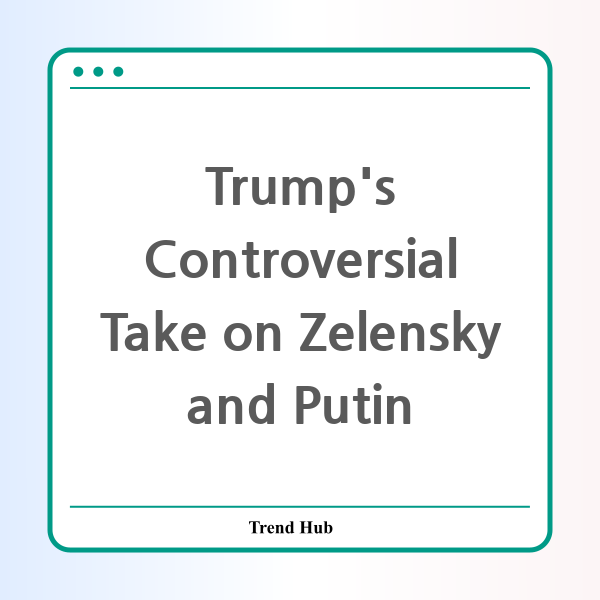* This website participates in the Amazon Affiliate Program and earns from qualifying purchases.

In the realm of international politics, few figures evoke as much discussion and debate as Vladimir Putin. Recently, former President Donald Trump reignited the conversation surrounding Putin, Ukraine, and President Volodymyr Zelensky through his controversial remarks during a Fox News interview.
Trump suggested that Zelensky should have refrained from fighting back against Russia during its invasion, which began in February 2022. This assertion raises significant questions about the nature of international alliances and the responsibilities of nations under threat. Trump emphasized that Zelensky was combating a far superior force and opined, "He shouldn’t have done that, because we could have made a deal." His comments spark a broader discussion on conflict resolution versus active resistance, particularly in the context of U.S. foreign policy.
The backdrop of Trump’s statements is crucial for understanding their implications. Russia, under Putin's leadership, has been a consistent adversary of the United States, while Ukraine stands as a critical ally. The conflict has led to staggering casualties and significant geopolitical ramifications. Trump’s comparison of military strength, noting Russia's larger number of tanks, adds to his narrative that resistance was futile. "You don’t fight those," he stated, which can be interpreted as a troubling dismissal of Ukraine's sovereignty and right to defend itself.
Furthermore, Trump has characterized Zelensky as "no angel," implying that the Ukrainian president’s decisions contributed to the escalation of the conflict. This viewpoint contrasts sharply with the Biden administration's stance, which has been to support Ukraine vigorously through aid packages and sanctions against Russia. Trump's proposal to impose massive tariffs if Russia does not negotiate peace reflects his approach to international relations—potentially favoring economic pressure over military support.
These statements bring to the forefront the dichotomy between different political philosophies regarding foreign intervention and diplomacy. Trump’s perspective leans towards negotiation and deal-making, which he claims he could have successfully executed with Putin to avoid war altogether. This highlights a recurring theme in Trump's rhetoric—a belief in his ability to broker favorable outcomes that others might view as unrealistic or overly simplistic.
As the conflict continues without a clear resolution, the differing approaches to foreign policy underscore the complexities of global diplomacy. The potential for peace talks, as suggested by Trump, hinges on various factors, including the willingness of both Russia and Ukraine to engage in dialogue rather than conflict. The Kremlin has indicated readiness to discuss ending the war, adding another layer to the ongoing narrative.
Ultimately, the discourse surrounding Trump’s comments on Ukraine and Putin reflects broader themes of power dynamics, national sovereignty, and the challenges of international diplomacy. The situation remains fluid, with significant consequences for the political landscape in Europe and beyond. As the dialogue continues to evolve, the focus will remain on how world leaders navigate these contentious relationships and the future of U.S. involvement in global conflicts.
* This website participates in the Amazon Affiliate Program and earns from qualifying purchases.